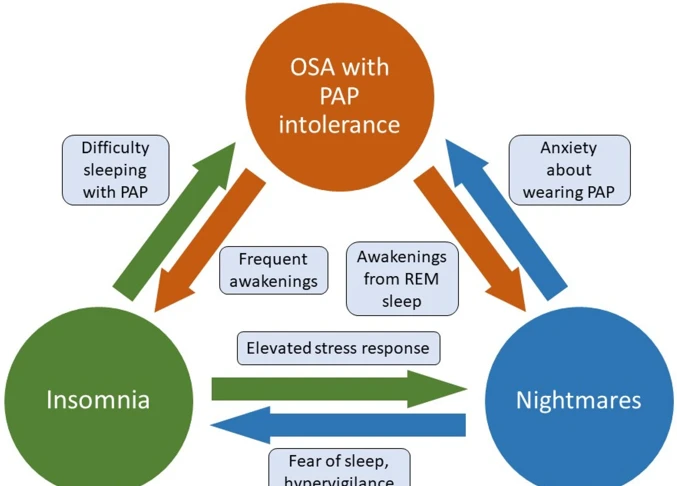
Have you ever woken up from a deep sleep, drenched in sweat and fear, with fragments of a terrifying dream lingering in your mind? Nightmares can be unsettling, but did you know that there may be a connection between these vivid and distressing dreams and a sleep disorder called sleep apnea? Sleep apnea, a condition characterized by interruptions in breathing during sleep, can disrupt your sleep patterns and lead to a host of negative effects on overall sleep quality. In this article, we will explore the link between sleep apnea and nightmares, shedding light on how this sleep disorder can impact the content and frequency of your dreams, as well as provide potential strategies for managing sleep apnea-related nightmares. So, if you find yourself grappling with reoccurring nightmares, stay tuned to uncover the intricate relationship between sleep apnea and these haunting experiences.
What is Sleep Apnea?
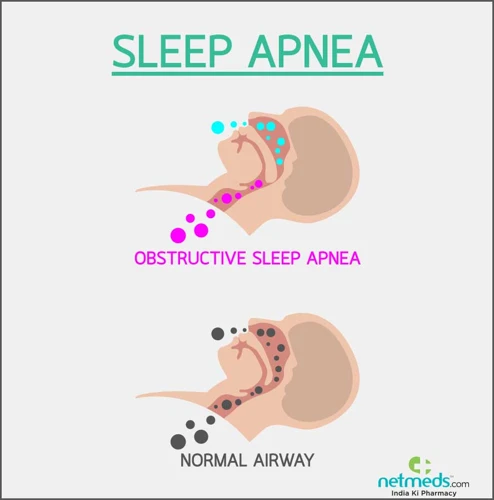
Sleep apnea is a sleep disorder characterized by repeated pauses in breathing during sleep. These pauses, known as apneas, can last for a few seconds to a few minutes and can occur multiple times throughout the night. This interruption in breathing is often caused by a blockage or collapse of the airway, leading to a decrease in oxygen levels in the body. There are three main types of sleep apnea: obstructive sleep apnea (OSA), central sleep apnea, and complex sleep apnea syndrome. OSA, the most common form, occurs when the muscles in the back of the throat fail to keep the airway open, resulting in shallow breathing or breathing pauses. Central sleep apnea, on the other hand, occurs when the brain fails to send the proper signals to the muscles that control breathing. Complex sleep apnea syndrome is a combination of both obstructive and central sleep apnea. Sleep apnea can have various symptoms, including loud snoring, excessive daytime sleepiness, morning headaches, and difficulty concentrating. It can also have a profound impact on overall health, increasing the risk of cardiovascular disease, diabetes, and even stroke. While the exact causes of sleep apnea are not fully understood, certain factors such as obesity, smoking, and family history can contribute to its development. If left untreated, sleep apnea can have detrimental effects on both mental and physical well-being. For more detailed information on sleep apnea causes, symptoms, and treatments, you can refer to our article “Sleep Apnea: Causes, Symptoms, and Treatments”.
What are Nightmares?
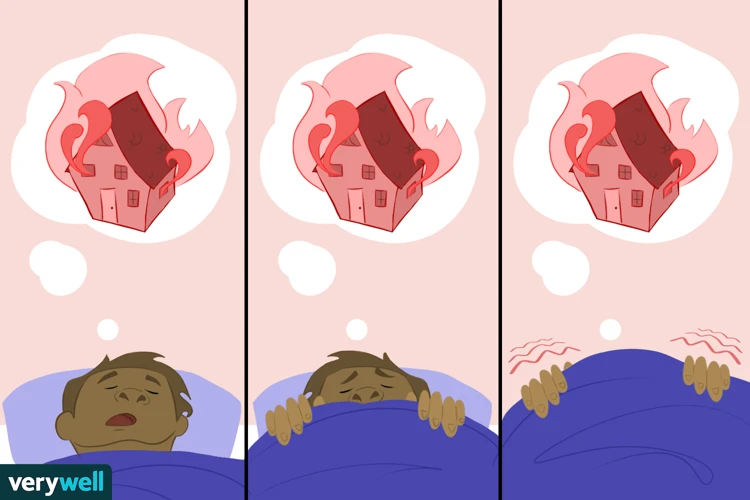
Nightmares are vivid and disturbing dreams that can evoke intense emotions such as fear, anxiety, and sadness. They typically occur during the rapid eye movement (REM) stage of sleep, which is associated with dreaming. During a nightmare, the dreamer may experience a sense of danger or threat, and the content of the dream can vary widely from person to person. Nightmares can often be remembered upon waking and may leave the individual feeling unsettled or distressed. While occasional nightmares are a normal part of sleep, frequent or recurring nightmares can significantly impact sleep quality and overall well-being. Some individuals with sleep apnea may also experience an increased frequency of nightmares. To learn more about the connection between sleep apnea and dream recall, you can refer to our article “Sleep Apnea and Dream Recall: Exploring the Relationship”. Additionally, there have been famous individuals who battled sleep apnea and shared their experiences with nightmares. For more insights on this topic, you can read about the dream experiences of famous sleep apnea battlers.
The Link Between Sleep Apnea and Nightmares
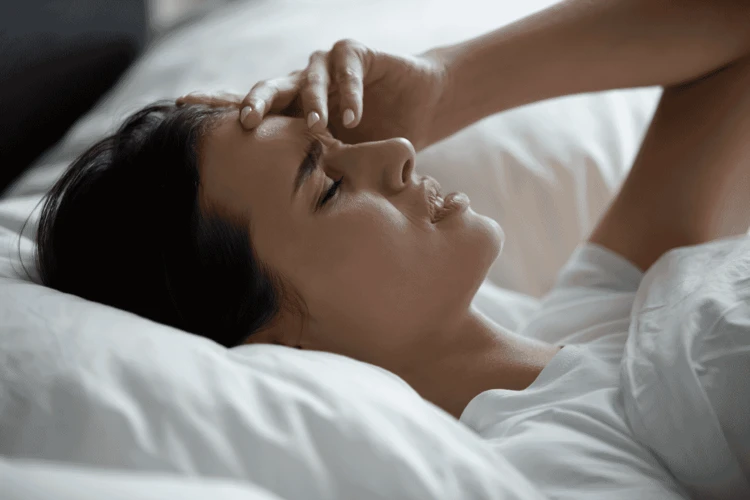
Sleep apnea and nightmares may seem like unrelated sleep disturbances, but there is a fascinating link between the two. The disruptions in sleep caused by sleep apnea can significantly impact dream patterns, leading to an increase in vivid and intense nightmares. One of the key factors contributing to this connection is the disruption of REM (rapid eye movement) sleep, the stage in which most dreaming occurs. Sleep apnea often disrupts REM sleep due to the frequent awakenings and interruptions in breathing, preventing individuals from experiencing a healthy dream cycle. Oxygen deprivation, a common characteristic of sleep apnea, can trigger nightmares by stimulating the brain’s amygdala, the region responsible for emotional processing. This combination of impaired REM sleep and oxygen deprivation can create a perfect storm for disturbing and distressing dreams. So, if you find yourself frequently plagued by nightmares and have symptoms of sleep apnea, exploring the link between the two could be an essential step towards improving your sleep quality and overall well-being.
1. Sleep Apnea Disrupts REM Sleep
When it comes to sleep apnea, one of the ways it can impact our dreams is by disrupting REM sleep. REM (rapid eye movement) sleep is a crucial stage of the sleep cycle where most dreaming occurs. During REM sleep, the brain becomes highly active, and our eyes move rapidly behind closed eyelids. This stage is associated with emotional processing, memory consolidation, and creativity. However, in individuals with sleep apnea, the interruptions in breathing can lead to frequent awakenings throughout the night, preventing them from reaching and maintaining REM sleep stages for an adequate duration. This disruption in the natural sleep cycle can result in a decreased amount of REM sleep and affect the overall quality of dreams. It is important to note that dreams predominantly occur during REM sleep, and reducing the time spent in this stage can limit dream recall. Individuals with sleep apnea may experience a reduction in dream frequency or have difficulty remembering their dreams. To learn more about the relationship between sleep apnea and dream recall, you can refer to our article “Sleep Apnea and Dream Recall: Is There a Connection?”. Understanding how sleep apnea impacts REM sleep can provide valuable insights into the potential link between sleep apnea and the content of dreams.
2. Oxygen Deprivation and Nightmares
One possible link between sleep apnea and nightmares is the issue of oxygen deprivation. During episodes of sleep apnea, the airway becomes partially or completely blocked, leading to a decrease in oxygen levels in the body. This lack of oxygen can trigger a cascade of physiological responses, including an increase in heart rate and a release of stress hormones. These physiological changes can create a state of heightened arousal, which may contribute to the occurrence of nightmares.
When the brain detects low oxygen levels, it can activate the amygdala, the part of the brain responsible for processing emotions. This activation of the amygdala might lead to the generation of vivid and intense emotions in dreams, potentially resulting in nightmares. Additionally, the decrease in oxygen levels can also affect the functioning of the prefrontal cortex, a part of the brain involved in regulating emotions and cognitive processes. This disruption in prefrontal cortex functioning might further contribute to the occurrence of nightmares.
It is important to note that not everyone with sleep apnea will experience nightmares as a result of oxygen deprivation. Factors such as individual susceptibility, severity of sleep apnea, and other coexisting conditions may influence the likelihood and frequency of nightmares.
If you’d like to learn more about the relationship between sleep apnea and dreaming, including the impact of sleep apnea on dream recall, you can refer to our article “Sleep Apnea and Dream Recall: What’s the Connection?”.
The Impact of Nightmares on Sleep Quality
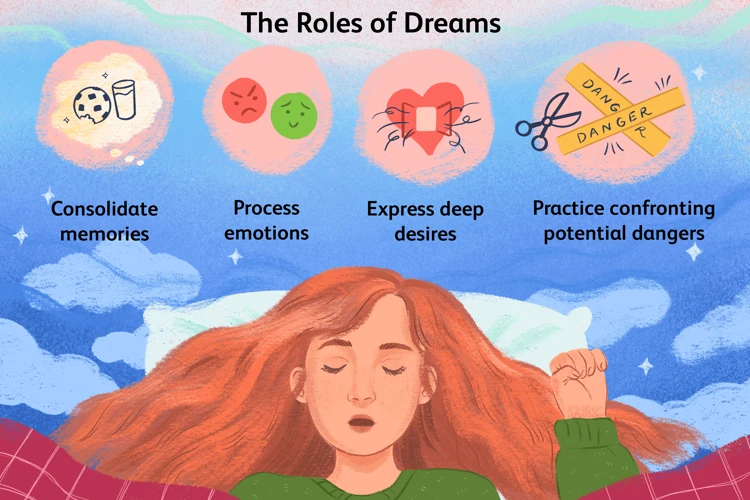
Nightmares can significantly impact the quality of our sleep, leaving us feeling restless and unsettled. They can disrupt our sleep patterns, leading to sleep fragmentation, where the sleep is repeatedly interrupted throughout the night. This constant arousal can result in a decrease in sleep efficiency, making it difficult for us to achieve restorative sleep. Additionally, nightmares are often associated with increased anxiety and stress, as they can evoke intense emotions and fear even after waking up. This heightened emotional state can further disrupt our ability to fall back asleep and maintain a deep, uninterrupted sleep. The negative impact of nightmares on sleep quality can contribute to daytime sleepiness, difficulty concentrating, and mood disturbances. It is essential to understand and address the factors contributing to nightmares to improve overall sleep health and well-being.
1. Sleep Fragmentation
Sleep fragmentation refers to the frequent disruptions in sleep that individuals with sleep apnea experience. During episodes of sleep apnea, the interruptions in breathing can cause the person to partially wake up, leading to fragmented sleep. These awakenings may not be fully conscious or remembered, but they still disrupt the normal sleep cycle. As a result, individuals with sleep apnea often suffer from a lack of deep, restorative sleep. This can lead to a range of negative consequences, including excessive daytime sleepiness, difficulty concentrating, and reduced cognitive function. Sleep fragmentation can also contribute to an increased risk of accidents and impaired performance in daily activities. The constant disruption of sleep can significantly impact the overall quality of life for individuals with sleep apnea. It is essential to address and manage sleep apnea to minimize sleep fragmentation and improve overall sleep quality.
2. Increased Anxiety and Stress
Increased anxiety and stress are two significant impacts of nightmares on sleep quality for individuals with sleep apnea. When nightmares occur, they can trigger a cascade of negative emotions, leaving individuals feeling anxious and stressed even after waking up. The vivid and often distressing content of nightmares can stay with a person throughout the day, causing heightened levels of anxiety and impacting their overall well-being. These feelings of anxiety and stress can further disrupt sleep, creating a vicious cycle where nightmares lead to poor sleep quality, which in turn increases anxiety and stress levels.
One of the reasons why nightmares can intensify anxiety and stress is their ability to evoke strong emotions and provoke a sense of fear and helplessness. As a result, individuals may experience heightened arousal during sleep, making it difficult to relax and fall back asleep after a nightmare. The lingering anxiety and stress can also contribute to increased levels of cortisol, a stress hormone, which further disrupts the sleep cycle. Additionally, the negative emotions associated with nightmares can spill over into waking life, impacting mood, concentration, and overall mental well-being.
To effectively manage the increased anxiety and stress caused by nightmares in individuals with sleep apnea, it is essential to address both the root cause of the nightmares and the underlying sleep disorder. Treating sleep apnea with methods such as continuous positive airway pressure (CPAP) therapy can help improve sleep quality and reduce the frequency of nightmares. Adopting a consistent sleep routine and implementing relaxation techniques, such as deep breathing exercises or meditation, can also promote a sense of calmness and reduce anxiety before bed. Seeking support from a healthcare professional or therapist experienced in sleep disorders and anxiety management can provide further guidance and assistance in managing the impact of nightmares on sleep quality. By effectively managing both sleep apnea and the associated anxiety and stress, individuals can improve their overall sleep quality and enhance their well-being.
3. Decreased Sleep Efficiency
Decreased sleep efficiency is another impact of nightmares on sleep quality, particularly in individuals with sleep apnea. When nightmares occur, they can disrupt the normal sleep cycle, leading to fragmented and inefficient sleep. This means that even though a person may spend an adequate amount of time in bed, they may not achieve the restorative deep sleep necessary for optimal health and well-being. Nightmares can cause awakenings throughout the night, causing individuals to wake up feeling groggy and tired. This can result in daytime sleepiness, difficulty concentrating, and decreased cognitive functioning. Additionally, the emotional distress caused by nightmares can make it difficult for individuals to fall back asleep, further contributing to decreased sleep efficiency. It is important to address sleep apnea-related nightmares and improve sleep efficiency to ensure a more restful and rejuvenating sleep experience.
How to Manage Sleep Apnea-Related Nightmares
If you are experiencing sleep apnea-related nightmares, there are several strategies you can implement to manage and alleviate their impact on your sleep. The first step is to seek treatment for sleep apnea itself. Addressing the underlying cause can improve overall sleep quality and potentially reduce the frequency and intensity of nightmares. Additionally, maintaining a consistent sleep routine can promote a more restful sleep and minimize disruptions in REM sleep, where nightmares are most likely to occur. Engaging in relaxation techniques, such as deep breathing exercises or meditation, before bed can also help reduce anxiety and stress levels that may contribute to nightmares. Creating a calm and soothing environment in your bedroom, free from distractions, can further promote better sleep and potentially reduce the occurrence of nightmares. Remember, managing sleep apnea-related nightmares requires a comprehensive approach that addresses both the sleep disorder itself and the factors that contribute to disturbing dreams.
1. Treat Sleep Apnea
One of the most crucial steps in managing sleep apnea-related nightmares is to treat sleep apnea itself. By addressing the underlying sleep disorder, you can significantly improve both the quality of your sleep and the frequency of nightmares. The treatment options for sleep apnea may vary depending on the severity of the condition and the individual’s specific needs. Here are some common approaches to treating sleep apnea:
1. Continuous Positive Airway Pressure (CPAP): CPAP therapy is considered the gold standard treatment for sleep apnea. It involves wearing a mask over the nose or mouth during sleep, which delivers a continuous flow of air pressure to keep the airway open. This prevents pauses in breathing, reduces snoring, and improves overall sleep quality.
2. Oral Appliances: Oral appliances are custom-made devices that are worn in the mouth to help keep the airway open. These appliances are designed to reposition the jaw or tongue, helping to prevent the collapse of the airway during sleep.
3. Lifestyle Modifications: In some cases, making certain lifestyle changes can have a positive impact on sleep apnea. This may include maintaining a healthy weight through diet and exercise, avoiding alcohol and sedatives, quitting smoking, and sleeping in a side position rather than on your back.
4. Surgical Interventions: For severe cases of sleep apnea that do not respond to other treatments, surgical procedures may be recommended. These procedures aim to remove excess tissue from the throat, repair structural abnormalities, or create a new airway passage.
5. Positional Therapy: Positional therapy involves using devices or techniques to encourage sleeping in a specific position that helps keep the airway open. This may include using special pillows, wearing backpacks, or utilizing positional alarms.
It is important to consult with a medical professional or sleep specialist to determine the most appropriate treatment approach for your sleep apnea. They can evaluate your specific condition and provide personalized recommendations based on your needs and preferences. Remember, effective treatment of sleep apnea can have a significant positive impact on reducing nightmares and improving overall sleep quality.
2. Maintain a Consistent Sleep Routine
Maintaining a consistent sleep routine can play a crucial role in managing sleep apnea-related nightmares. A regular sleep schedule helps regulate the body’s internal clock, promoting a more restful and uninterrupted night of sleep. To establish a consistent sleep routine, it’s important to set a fixed bedtime and wake-up time, even on weekends. This helps train the body to follow a predictable sleep-wake pattern. Additionally, creating a pre-sleep routine can signal to the body that it’s time to wind down and prepare for sleep. This routine can include activities such as dimming the lights, engaging in relaxation techniques like deep breathing or meditation, and avoiding stimulating activities or electronic devices in the hour leading up to bedtime. Creating a relaxing sleep environment is also crucial. Ensure that the bedroom is cool, dark, and quiet, and consider using earplugs or a white noise machine to block out any disturbances. By maintaining a consistent sleep routine, individuals with sleep apnea can promote a healthier sleep pattern and potentially reduce the frequency of nightmares.
3. Practice Relaxation Techniques
Practicing relaxation techniques can be beneficial for managing sleep apnea-related nightmares. When your body and mind are relaxed, it becomes easier to fall asleep and stay asleep throughout the night. There are several relaxation techniques that you can incorporate into your daily routine to promote better sleep and reduce the likelihood of nightmares.
One effective technique is deep breathing exercises. Deep breathing involves taking slow, deep breaths, focusing on inhaling and exhaling deeply. This practice helps to activate the body’s relaxation response, reducing stress and anxiety that can contribute to nightmares. You can try deep breathing exercises before bedtime or whenever you feel tense or anxious during the day.
Another technique is progressive muscle relaxation. This involves systematically tensing and then releasing each muscle group in your body, promoting a sense of relaxation and releasing tension. By consciously focusing on each muscle group, you can encourage your body to let go of any physical stress or tension that may be contributing to nightmares.
Incorporating mindfulness meditation into your daily routine can also be beneficial. Mindfulness involves bringing your attention to the present moment and observing your thoughts and feelings without judgment. This practice promotes relaxation, reduces stress, and can help to alleviate anxiety that may be triggering nightmares. You can try guided meditation apps or videos to help you get started with mindfulness meditation.
In addition to these relaxation techniques, establishing a bedtime routine that promotes relaxation and winding down can also contribute to better sleep quality. This may include activities such as taking a warm bath, reading a book, or listening to calming music. Creating a peaceful and comfortable sleep environment, free from distractions and noise, can also support relaxation and reduce the likelihood of nightmares.
Remember, it may take time and practice to find the relaxation techniques that work best for you. Experiment with different approaches and be patient with yourself as you explore what helps you relax and sleep peacefully. If sleep apnea-related nightmares persist or significantly impact your quality of life, it’s important to consult with a healthcare professional for further evaluation and guidance.
Conclusion
In conclusion, it is evident that there is a strong link between sleep apnea and nightmares. Sleep apnea disrupts REM sleep, which is the stage of sleep where dreams typically occur, leading to a higher likelihood of experiencing nightmares. Additionally, the oxygen deprivation that can occur during sleep apnea episodes may trigger nightmares. These nightmares can have a significant impact on sleep quality, causing sleep fragmentation, increased anxiety and stress, and decreased sleep efficiency. It is important for individuals with sleep apnea to seek treatment to alleviate the symptoms and manage the associated nightmares. Treatment options for sleep apnea include lifestyle changes, such as weight loss and avoiding alcohol or sedatives before bedtime, as well as medical interventions like continuous positive airway pressure (CPAP) therapy. In addition to addressing sleep apnea, maintaining a consistent sleep routine and practicing relaxation techniques can also help manage sleep apnea-related nightmares. By taking these steps, individuals with sleep apnea can improve their sleep quality and reduce the frequency and intensity of nightmares. It is essential to consult with a healthcare professional for a proper diagnosis and personalized treatment plan. With the right approach, it is possible to achieve restful nights and minimize the impact of nightmares on overall well-being.
Frequently Asked Questions
1. Can sleep apnea cause nightmares?
While sleep apnea itself may not directly cause nightmares, it can disrupt the normal sleep cycles and lead to fragmented sleep. This disruption can increase the likelihood of experiencing vivid and disturbing dreams, including nightmares.
2. Is there a connection between sleep apnea and sleepwalking?
There is no proven direct link between sleep apnea and sleepwalking. However, both sleep apnea and sleepwalking can be caused by underlying sleep disorders or disturbances, such as fragmented sleep or poor sleep quality.
3. Can treating sleep apnea help reduce nightmares?
Yes, by effectively treating sleep apnea, it is possible to improve sleep quality and reduce the occurrence of nightmares. Continuous positive airway pressure (CPAP) therapy, a common treatment for sleep apnea, can help keep the airway open during sleep, leading to better sleep and potentially fewer nightmares.
4. Are nightmares more common in people with sleep apnea?
Research suggests that individuals with sleep apnea may have a higher prevalence of nightmares compared to those without the condition. The disturbances in sleep caused by sleep apnea can contribute to the occurrence of nightmares.
5. Can untreated sleep apnea lead to insomnia?
Untreated sleep apnea can contribute to insomnia symptoms. The frequent awakenings throughout the night due to breathing interruptions can make it difficult to fall back asleep, leading to insomnia and sleep disruptions.
6. Can weight loss help alleviate sleep apnea-related nightmares?
Weight loss can have a positive impact on sleep apnea symptoms, including nightmares. As excess weight can contribute to the development or worsening of sleep apnea, losing weight through a healthy diet and regular exercise may help improve sleep quality and reduce the occurrence of nightmares.
7. Are there any home remedies to manage sleep apnea-related nightmares?
While there are no specific home remedies to directly address sleep apnea-related nightmares, maintaining a consistent sleep routine, practicing relaxation techniques, and creating a conducive sleep environment can help improve overall sleep quality and potentially reduce the frequency of nightmares.
8. Can children with sleep apnea experience nightmares?
Yes, children with sleep apnea can experience nightmares. Sleep apnea in children can disrupt their sleep patterns, leading to an increased likelihood of experiencing nightmares or other sleep disturbances.
9. Can medication for sleep apnea worsen nightmares?
There is no evidence to suggest that medication commonly used to treat sleep apnea can worsen nightmares. However, it’s essential to consult with a healthcare professional about any concerns regarding medication and their potential side effects.
10. Is it possible to outgrow sleep apnea-related nightmares?
While it is possible for some individuals to outgrow sleep apnea, it is not guaranteed. For some people, sleep apnea may persist throughout adulthood. However, by effectively managing sleep apnea through appropriate treatment, the occurrence of nightmares can potentially be reduced or eliminated.

